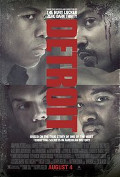
Directed by
Kathryn Bigelow
143 minutes
Rated MA
Reviewed by
Bernard Hemingway

Detroit
Synopsis: During the summer of 1967 at the height of the Civil Rights movement as rioting spreads through the black neighbourhoods of Detroit, a harmless incident escalates out of control leaving three young black men dead.
With her 2008 Oscar-sweeping film The Hurt Locker director Kathryn Bigelow showed that an intelligent action movie not only is possible but that it can be very good. She followed up that film with the thematically-related Zero Dark Thirty in 2012. Whilst in some respects it would be more adventurous for her to tackle a “woman’s” film with Detroit she, with the help of her screenwriter Mark Boal, who collaborated with her on both The Hurt Locker and Zero Dark Thirty, once again demonstrates that not only can a woman command what traditionally is regarded as a male genre but that a white director can bring home powerfully a black point-of-view (how much American film-making has progressed in this respect is evident when we compare Bigelow’s film with Joseph L. Mankiewicz's well-meaning but compromised thematically-related 1950 film, No Way Out).
After a brief summary sketching in the historical background to the 1967 Detroit riots Bigelow throws us into their chaos, seamlessly integrating archival footage with her own recreations (those who find hand-held camerawork uncongenial will be taxed) before introducing the film’s structuring narrative device in the form of, on the one hand, a group of young friends trying to break into the Motown music scene with their vocal group, The Dramatics, and, on the other, a pair of patrol car policemen, Krauss and Flynn (Will Poulter and Ben O’Toole) who are assigned to stop looters.
The two narrative arcs begin to approach each other when the theatre that they were to perform in is evacuated because of the riots and group members, Larry (Algee Smith) and Fred (Jacob Latimore) decide to stay overnight in the nearby Algiers Motel. The lads flirt with a couple of white female occupants (Kaitlyn Dever and Hannah Murray) but when one of the people staying at the motel foolishly shoots a starter pistol through a window at members of the National Guard, they find themselves in the middle of a siege. Krauss, Flynn and a third policeman, Demens (Jack Reynor), are part of the group that swoops on the motel. Krauss shooting one black man in the back (we have seen him do something similar earlier in the day) and hastily trying to deflect attention from his act by holding an on-the-spot “investigation”. By the end of the night two more black youths including Fred are dead.
Based on the historical facts of the so-called Algiers Motel Incident the centre-piece of Bigelow’s film is the “interrogation”, a long and gruelingly intense sequence that takes us into the heart of the race hate that poisoned so much of America in the 1960s. A lesser director would have fallen back on all manner of action movie heroics and plot twists here but all that Bigelow gives us is innocent people in fear of their lives and cowardly bullies in police uniforms terrorizing them. Although some may feel this brutalizing goes on too long, taxing the film's otherwise-convincing bona fides as history by protracting what must in reality be largely fictionalized, we feel ultimately that Bigelow made the right decision. In a way we owe it to the real lives lost that night and by extension, to the many black people who have died at the hands of white racists,to feel the fear that was an everyday reality for black people at that time. The word “visceral’ is often bandied about when it comes to action movies but Ms. Bigelow is one director with whom it means something. You feel the fear in your guts.
As the disconcertingly calm racist Krauss, Poulter, a young English actor, is an outstanding find, his distinctive looks embodying a pathological but frighteningly calculating malevolence whilst his fellow officers Flynn and Demens are a couple of typical dim-wits all-too-easily persuaded by him to partake in their heinous deeds.
Detroit is both an accomplished film and, unusually for our times, one with a strong social and political message, It is not, however, bar some brief moments of fine soul singing, one which,offers much in the way of light relief. Quite the contrary. Given that, you should see it while you can.

Want more about this film?


Want something different?




